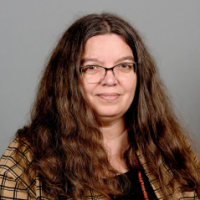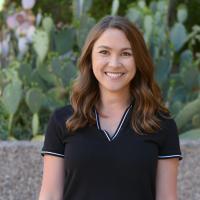SOLS faculty and graduate student earn FWA awards for mentorship and research
From left, this year's FWA award recipients from SOLS: Emilia Martins, Katey Cooper and Sammie Harker.
Each year, the Arizona State University Faculty Women’s Association (FWA) recognizes outstanding faculty mentors and distinguished graduate students at their annual awards program.
The FWA is an organization dedicated to providing support for faculty success and innovation at ASU. Since its founding in 1954, the FWA has served as an important resource to all faculty through our programming, advocacy efforts and special networking events.
A mark of a great leader is the support and guidance that they provide to others through mentorship. The Outstanding Faculty Mentor Award seeks to recognize faculty members who have demonstrated outstanding mentorship to students or to other faculty members, or both, particularly women and other underrepresented groups.
The Distinguished Graduate Student Achievement Award recognizes doctoral and master’s degree candidates who have distinguished themselves through exceptional scholarship, research, creative activities and noteworthy performance in leadership and service.
This year, two faculty members from the School of Life Sciences and one graduate student were awarded FWA awards for their outstanding mentorship and research.
Emilia Martins
Outstanding Faculty Mentor Award
Professor Martins studies behavioral evolution by mapping the ancient history of lizard communication in the southwestern U.S. and by studying how sensory systems impact social behavior and resilience to climate change in the biomedically-important zebrafish. Martins' research program asks about the evolution of complex behavioral phenotypes, and how evolutionary forces have interacted over long periods of time to shape phenotypic change. Her lab has pioneered the use of phylogenetic comparative methods to infer the evolutionary mechanisms underlying phenotypic evolution, and has also contributed substantially to our understanding of how different sensory systems intertwine to produce and to perceive animal communicative signals.
Martins says that "there’s nothing more fulfilling than interacting with early career scientists. This award was a very welcome and unexpected recognition of work that I’ve thoroughly enjoyed doing!"
Katey Cooper
Outstanding Faculty Mentor Early Career Award
Katey Cooper is an undergraduate/graduate biology education researcher. The Cooper Lab studies how science learning environments affect undergraduate/graduate mental health, and in turn, how students' mental health impacts their experiences in science learning environments.
"The outstanding faculty mentor award is really meaningful to me because I'm only in this position because of all of the mentors in my life who invested in me along the way," says Cooper. "I learned from their examples how to intentionally guide students to be exemplary researchers while ensuring that they have the psychosocial support that they need as they push themselves beyond their perceived limitations. I'm very grateful for the role my mentors have played in my career, and that I can impart what they taught me to the next generation of students."
Samantha Harker
Distinguished Graduate Student Award
Samantha (Sammie) Harker's research addresses the genetic contributors to aging and sex differences on cognition and brain structure in a longitudinal cohort of middle-aged and older (MA+) autistic adults (40-75 years of age). She will evaluate the effects of autism likelihood genes on memory decline and temporal lobe/hippocampal aging in MA+ autistic adults. Results will significantly impact the biological understanding of cognitive, brain aging, and sex differences in autism by incorporating both molecular and systems-level approaches. The dissemination of findings to the broader autism community will be empowered by Harker’s unique perspective as an openly autistic adult.
Harker says, "it is an honor to be selected for the FWA award and recognized alongside other amazing graduate students. As an autism researcher, I am thrilled that my work and journey as an actual autistic person is starting to have a positive impact on my community and that the FWA believes in me and my work as well. I am also so grateful for the support of my incredible mentors to have these opportunities."


